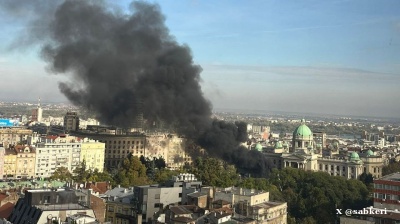Turkey has been forced to evacuate thousands of holidaymakers in the past couple of days as the wildfires sweeping through its tourist regions of Antalya and Mugla posed a threat to Mediterranean and Aegean resorts.
The wildfire disaster comes as a wretched blow to a tourism industry that was already on its knees, decimated by the coronavirus crisis but attempting to stage at least a partial recovery in the midsummer months. The Guardian, meanwhile, reported late on July 30 that the heat intensity of the wildfires in Turkey measured with satellite data on July 29 was four times higher than anything on record for the nation.
Officials said at least four people have been killed by blazes that swept through tinder dry territory of the tourist regions of Antalya and Mugla, forcing thousands of holidaymakers to be evacuated from their hotels by a flotilla of boats.
Graphic posted by "Dogannguzell" on Twitter under trending hashtag #PrayForTurkey.
More than 70 wildfires have broken out this week in provinces on Turkey's Mediterranean and Aegean coasts as well as inland areas, President Tayyip Erdogan said on July 30, adding that 14 were still burning. Planes from Russia and Ukraine assisted in the battle against the flames and an aircraft from Azerbaijan was joining them. "As of midday, with the arrival of the planes, we are turning in a positive direction," Erdogan told reporters after Friday prayers.
Erdogan said at least five planes, 45 helicopters, drones, and 1,080 firefighting vehicles were involved in firefighting efforts at 1,140 sites.
Sputnik, quoting Minister of Forestry and Agriculture Bekir Pakdemirli, reported on July 30 that the wildfires across southern Turkey had injured over 180 people. It added that 183 people suffered from smoke inhalation from a wildfire in Antalya's Manavgat.
Temperature record broken
Turkey’s 60-year-old temperature record was broken last week in the southeastern town of Cizre. The temperature was registered 49.1C.
Reuters said villages and some hotels were evacuated in tourist areas and television footage showed people fleeing across fields as fires closed in on their homes. Local media published photos of popular Aegean Sea resorts surrounded by burning hillsides. Forest and farmland were reduced to ash. At the popular tourist spot of Bodrum, in Mugla province, 80 hectares (197 acres) were lost to the inferno. The flames cut off two hotels. That forced the evacuation of more than 4,000 tourists and staff using a flotilla of coastguard and fishing vessels.
TASS reported from Bodrum, relaying the observations of deputy director general of Anex Tour, Yana Muromova, on the situation with tourist evacuations. "The hotel itself is not on fire. The tourists are being evacuated as part of precautionary measures. A forest on a hill adjacent to Titanic Deluxe Bodrum Hotel buildings is burning. The tourists are being moved to the nearby Lujo Hotel Bodrum and La Blanche Resort Bodrum. As for these two hotels, there has been no decision on evacuating tourists yet," she said.
The summer brings wildfires to Turkey every year, but this year’s are exceptional. The Guardian said satellite analysis by the EU’s Copernicus Atmosphere Monitoring Service showed the heat intensity of the country’s fires on July 29 reached about 20 gigawatts, four times higher than the previous daily maximum.
“Off the scale”
“Those numbers are off the scale compared to the last 19 years,” Mark Parrington, a senior scientist at the Copernicus service was quoted as saying.
The Turkish meteorological office has said it anticipates that the heatwave hitting much of Turkey will continue in the week ahead. Ankara, for instance, is set for temperatures more than 12C higher than the August average.
On Twitter, #PrayForTurkey was trending with images of devastation.
Government ministers have speculated that the cause of the massive outbreak of fires may be arson attacks by the Kurdish separatist movement PKK. But they have not provided any evidence of arson.
The scenes unfolding in Turkey have been long predicted by climate scientists, who have concluded that the wider Mediterranean region will be severely impacted by rising temperatures and rainfall changes amid climate change caused by human emissions.
News

Russia rules out seizing EU assets but warns of retaliation if confiscations proceed
Russia will not seize European Union assets currently operating within its borders, Russian Deputy Finance Minister Alexei Moiseev has said.

China’s state-owned oil giants halt Russian crude purchases in response to US sanctions
China’s state-owned oil giants have paused their purchase of Russian crude oil in response to recent US sanctions targeting Moscow’s two largest oil firms, Rosneft and Lukoil

Switzerland reopens Baghdad embassy after 30-year closure
Switzerland reopened its Baghdad embassy after 30 years, with Iraqi and Swiss foreign ministers officiating ceremony reflecting confidence in Iraq's stability and signalling expanded economic cooperation.

Brazil's Lula announces fourth presidential run at 80
Brazilian President Luiz Inácio Lula da Silva has announced he will seek re-election in October 2026, confirming his candidacy during a state visit to Indonesia on October 23.




